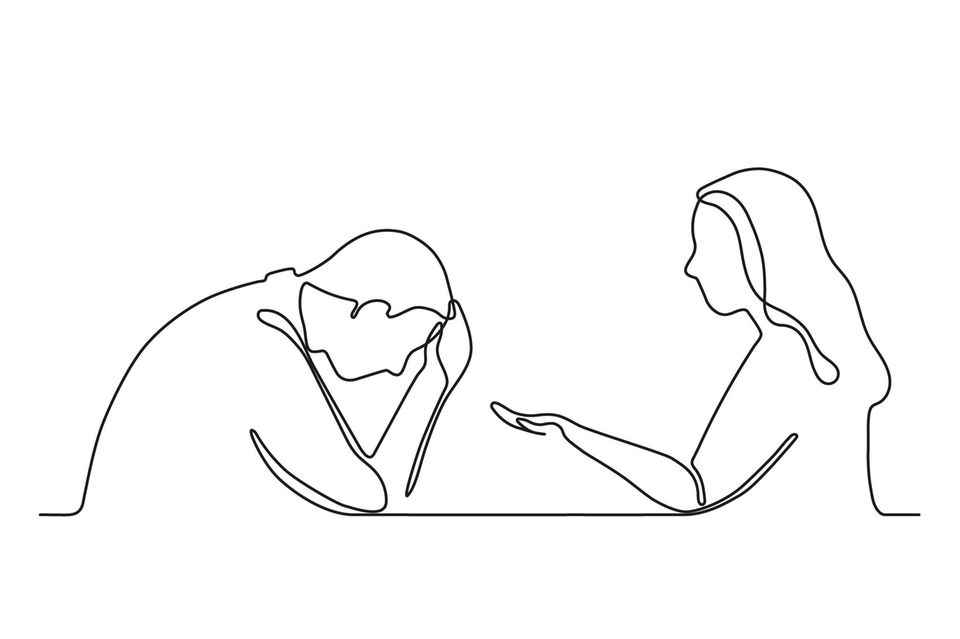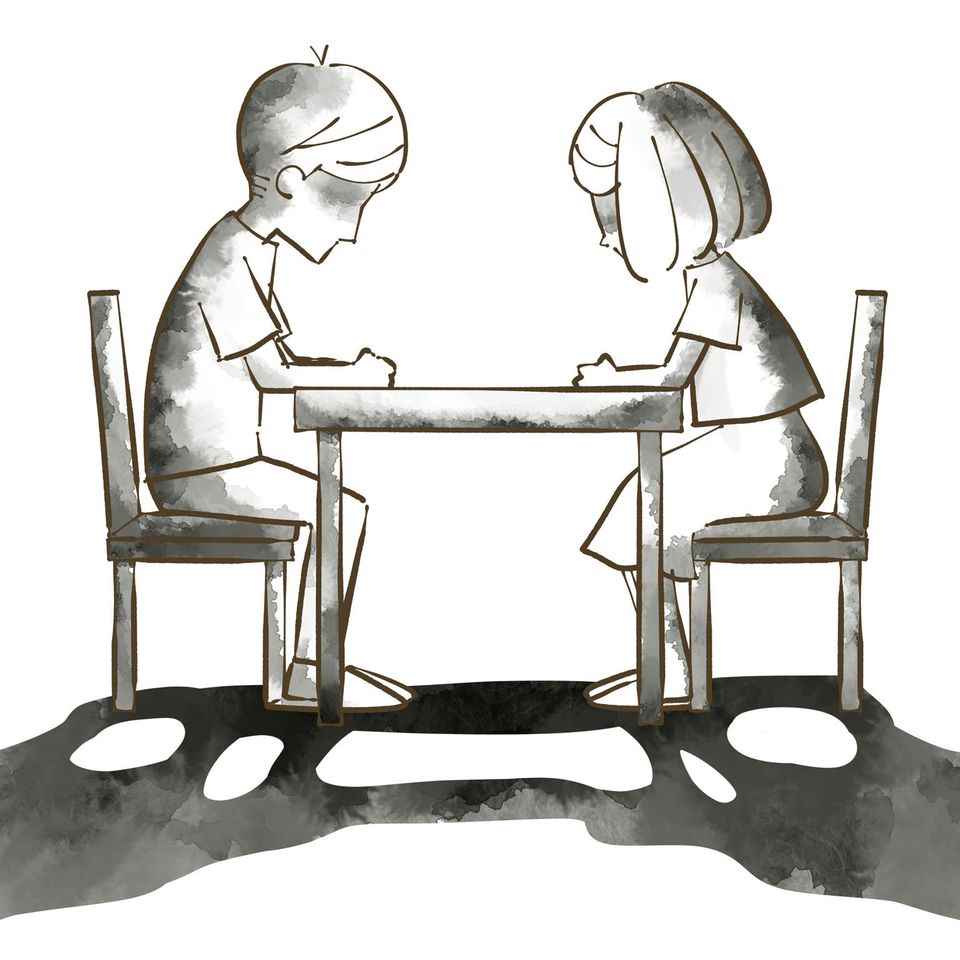Although we know that some people are not good for us, it is difficult for us to draw the line – why?
“He was way too drunk again, made fun of me and spit water in my face ‘for fun’,” says a friend to me and my eyes widen. I beg your pardon? It’s not the first time that my girlfriend has told me about her current boyfriend’s impossible behaviorand with every action he seems to want to outperform or rather underperform.
Another friend years ago had a “relationship,” if you can call it that, with a man who was toxic in a very different way. He was more or less fresh off his honeymoon and the two met at work. An affair developed rather quickly, and his wife, who had the same employer, got wind of it. When she confronted the two, he denied his affair so convincingly that even my girlfriend began to doubt whether the last few weeks had only happened in her head.
Just two examples of many in which someone was treated disrespectfully in a relationship – in the second example, the man managed a sweeping attack. I still wonder to this day how these wonderful, intelligent and self-confident people could end up in such partnerships – and take so long to draw the line. To say: “So far and no further!” The fact is: They are just two of countless examples, probably everyone in their own environment knows at least one person who was caught in a toxic relationship – or even to this day. Maybe you are or were in one yourself.
Why is it so difficult for us to refuse people who, rationally speaking, are absolutely not good for us? We have collected some possible reasons in this article.
Many people are afraid of being alone The fear of loneliness keeps some people in unhealthy relationships © tugolukof / Adobe Stock
“Better with him than completely alone” may be an argument that you hear more often when you dare to be a friend and address the apparently unhealthy relationship of the other person. The fear of being alone has been scientifically examined in various studies for decades. This form of anxiety can be understood as an “avoidance attitude accompanied by disturbing thoughts and feelings of abandonment that the person experiences when alone,” states in a study.
Older couples in particular, for whom the understanding of relationship and love is sometimes different than that of younger generations, shy away from leaving their partner because they fear being alone. But the sad fact is this: You can be alone in a relationship, especially if you’re not compatible with the person. When you don’t feel seen, respected and valued for yourself and your own needs.
“I don’t deserve any different”
In the online magazine “Thought Catalog” Kirsten Corley writes about her own experiences in a toxic relationship. How many times she heard from friends questions like “Why do you let something like that be done to you?” or “How can you love someone like him?”. She summarizes the real problem for many people in toxic relationships as follows:
“Toxic relationships aren’t relationships where someone isn’t good for you. Toxic relationships are the relationships you have with yourself that you feel you don’t deserve any differently.”
The relationship with a person who regularly hurts her in the most intimate way has left scars on the author. Over time, healthy relationships felt abnormal to them, kind men like unicorns that could only exist in fairy tales. She was used to men who first build her up emotionally and then tear her down. That was her idea of a relationship. “That’s what this toxic relationship did to me.” Some people take this idea of a relationship with them from their childhood.
Some people think that a relationship has to be like this Our understanding of relationships is also shaped by childhood © Iuliia / Adobe Stock
Quarrels, insults, physical attacks – experiencing such things shapes a person, especially if they happened in childhood. “If you learned early on to associate love with conflict, impermanence, or inconsistency, you may subconsciously hold onto hope that this time may be different,” says an article on Psychology Today.
This time man is not the helpless child who has had to watch his own parents put themselves down. This time, this person is in control of their own situation, of the course of history, or so they may think. And he can “save” the partner:in – and himself. But that is a fallacy.
“I can change this person, get the best out of him”
“I really don’t know what you see in her” – how often do we hear such and similar sentences in films and series? When the protagonist is the only person able to look behind the facade of the “bad boy”, sees the wonderful person underneath and, against all odds, comes together with this person and becomes happy. How romantic! And how far from reality.
What some of us may see in our relationship partners—their potential to be loving, considerate, and respectful—doesn’t have to match who they really are. In her article, Corley writes:
“You can’t change people, you can only love them. And you can love a person very hard, but not hard enough for them to love you back as much as you deserve.”
Holding on to the hope that this person will change, that this time they will behave differently, is a recipe for many, many disappointments. And we obscure our own view of the clear realization that this person is simply not good for us. Psychologist Roxy Zarrabi writes about this on “Psychology Today”:
“Those who cling to hope that their partner will change are acting like a starving person who just keeps eating crumbs hoping they will make a whole meal.”
Why it is so important to let go Ending a toxic relationship is also about you © Jorm S / Adobe Stock
Man is looking for love, it is in his nature. But if you are in a toxic relationship and cannot let go, you must realize that what is between you cannot be love. Because where there is love, there can be no violence. If your partner is showering you with compliments and affection one moment, but is yelling at you, putting you down, and getting attached the next, that is violence.
You will not be able to find the solution or the blame in the other person: it is up to you to understand why you are staying with someone who is hurting you psychologically, maybe even physically, who is making you feel hopeless, who is putting you in takes you to heaven, only to drop you back into deepest hell shortly thereafter.
is it fear Is it the feeling of not having deserved it any other way? Or the hope of being able to change that person? It can help in such cases to really listen to your friends, to let the warnings they give get to you. They may not be able to grasp the depth and complexity of the relationship, but they see things that you may have lost sight of yourself. And sometimes the things they see are enough. Professional help, counseling centers, therapies, pastoral care can also be a first step.
Nobody deserves violence. Neither do you.
If you need help, you can contact these contact points, for example:
- Telephone counseling: 0800-111 011 1
- Help line “Violence against women” of the Federal Office for Family and Civil Society Tasks: 08000 116 016
Sources used: psychologytoday.com, thoughtcatalog.com, frontiersin.org, forbes.com, psychcentral.com

